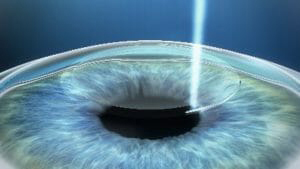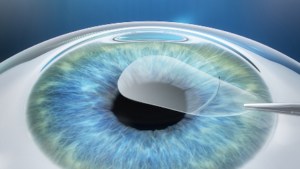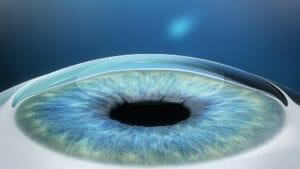
SMILE (Small Incision Lenticule Extraction) is an FDA approved form of laser eye surgery that has recently gained popularity. It is a minimally invasive procedure that corrects nearsightedness, farsightedness, and astigmatism.
The procedure involves creating a small incision in the cornea and using a laser to remove a small lenticule of tissue from within the cornea. This reshapes the cornea and corrects the refractive error causing the vision problem. Unlike other forms of laser eye surgery, such as LASIK, SMILE does not involve creating a flap in the cornea.
SMILE is considered a safer and more precise method of laser eye surgery. It has fewer risks of complications, such as dry eyes and corneal ectasia, which can occur after LASIK. Additionally, the SMILE procedure does not require as much corneal tissue to be removed, making it a better option for patients with thinner corneas.
The procedure is relatively quick, taking only about 10-15 minutes per eye. First, the patient is given a local anesthetic to numb the eye, and then the surgeon uses a femtosecond laser to create a small incision and remove the lenticule. The incision is so small that it usually does not require stitches to close.
SMILE Procedure

A refractive lenticule and small incision are created inside the intact cornea – all in one step.

The lenticule is subsequently removed through this small incision, leaving the remainder of the surperficial cornea intact.

Removing the lenticule changes the shape of the cornea, thereby achieving the desired refractive correction.
Good candidates for SMILE eye surgery typically have the following characteristics:
- Stable prescription: Your prescription should have been stable for at least a year before considering SMILE eye surgery. Significant changes in prescription may require additional adjustments to the procedure.
- Healthy eyes: Your eyes should be free of pre-existing conditions, such as cataracts, glaucoma, or severe dry eye syndrome. Any underlying eye conditions must be treated before undergoing SMILE eye surgery.
- Age: Patients must be at least 18 years old to undergo SMILE eye surgery.
- Prescription range: SMILE eye surgery can correct a range of prescriptions, including mild to moderate nearsightedness (-1.00 to -10.00 diopters) with astigmatism up to 3.00 diopters.
- Corneal thickness: SMILE eye surgery requires a minimum corneal thickness of 500 microns. During the consultation, your surgeon will measure your corneal thickness to determine if you are a good candidate.
- Overall health: Patients should have good overall health, with no active infections or medical conditions affecting the healing process.
It’s important to note that each patient’s eyes are unique. A thorough consultation with the experienced surgeons at Milwaukee Eye Care Center will help determine if you are a good candidate for the procedure.
Meet Our Milwaukee Avenue Eye Center SMILE Surgeon
Kevin Sullivan M.D.
Dr. Kevin L. Sullivan is a board-certified ophthalmologist and surgeon with over 20 years of experience providing complete eye care. He received his Bachelor of Science degree in Biology from Northwestern University and his Doctor of Medicine degree from Loyola University School of Medicine. He completed an internship in internal medicine at Evanston Hospital and his ophthalmology residency at Wills Eye Hospital. Dr. Sullivan was inducted into the Phi Beta Kappa Society at Northwestern and the Alpha Omega Alpha Honor Medical Society at Loyola.
Dr. Sullivan performs cataract surgery, corneal transplants, laser surgery and laser vision correction. He has staff privileges at Resurrection Medical Center and St. Alexius Medical Center. He is a member of the American Academy of Ophthalmology and the Illinois Association of Ophthalmology.


